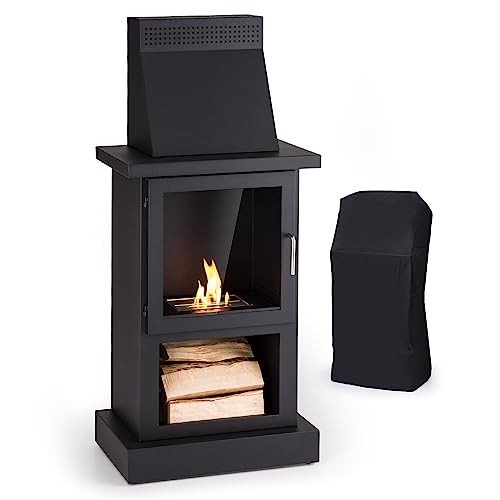10 Inspirational Graphics About Best Fireplace
The Best Fireplaces: A Comprehensive Guide for Homeowners
Fireplaces have long been a cherished function in homes, offering both warmth and an inviting environment. They come in various styles, sizes, and fuel types, allowing property owners to select one that fits their personal aesthetic and heating requirements. This post digs into the very best fireplaces, highlighting essential features and factors to consider to assist you make an informed decision.
Kinds of Fireplaces
Comprehending the various kinds of fireplaces is essential in selecting the best option for your home. Below are the most frequently utilized fireplaces:
Wood-Burning Fireplaces
- Advantages: Traditional appeal, natural ambiance, and reliable heating.
- Disadvantages: Requires regular maintenance, ash disposal, and is subject to local guidelines concerning emissions.
Gas Fireplaces
- Advantages: Convenient, clean-burning, and easy to run.
- Drawbacks: Requires a gas line, can be more costly to set up at first.
Electric Fireplaces
- Benefits: Easy setup, low upkeep, and the most safe alternative for homes with children or pets.
- Downsides: Lack the genuine feel of wood or gas flames, might not warm large spaces successfully.
Pellet Stoves
- Advantages: Eco-friendly, effective, and offer a steady heat output.
- Downsides: Requires electricity to run, and pellet supply can be limited in some areas.
Ethanol Fireplaces
- Advantages: No chimney needed, portable, and ecologically friendly.
- Downsides: Generally less effective for heating.
A Comparison of Fireplace Types
Type
Installation Cost
Running Cost
Heat Output
Upkeep
Environmental Impact
Wood-Burning
₤ ₤
₤
High
High
Moderate
Gas
₤ ₤ ₤
₤ ₤
Medium-High
Low
Moderate
Electric
₤
₤ ₤
Low
Extremely Low
Low
Pellet
₤ ₤
₤
Medium
Medium
Low
Ethanol
₤ ₤
₤ ₤ ₤
Low
Extremely Low
Very Low
Top Considerations When Choosing a Fireplace
When you're in the marketplace for a brand-new fireplace, keep the list below elements in mind to ensure you select the very best one for your home:
Purpose and Functionality: What do you desire your fireplace to do? Is it for heating or visual appeals? This will direct your option considerably.
Space Availability: Measure the location where you desire to set up the fireplace. Make sure the chosen type fits without frustrating the space.
Fuel Source: Assess the schedule and expense of different fuel sources in your area to avoid unanticipated expenses.
Setup Complexity: Some fireplaces may need significant changes to your existing home structure.
Building Codes and Regulations: Be conscious of local laws concerning ventilation, security, and emissions, as these can affect your fireplace choice.
Aesthetic Appeal: The design and style of a fireplace can work as a centerpiece or complement the existing design, so pick one that enhances your home's general aesthetic.
Benefits of a Fireplace
Adding a fireplace to your home pays for many benefits:
Enhanced Aesthetic Appeal: A fireplace can elevate the decoration of any space, developing a cozy and inviting environment.
Increased Home Value: A well-installed fireplace can add significant value to your home, making it attracting prospective buyers.
Energy Efficiency: Modern fireplaces, particularly gas and pellet ranges, can offer efficient heating while minimizing energy costs.
Emergency Situation Heat Source: In cases of power blackouts, a wood or gas fireplace can function as a dependable heat source.
Celebration Space: Fireplaces often end up being the centerpiece for gatherings, promoting warmth and comfort during friend or family' get-togethers.
Frequently Asked Questions (FAQs)
**Q: How much does it cost to install a fireplace?A: Installation costs can differ considerably based on the type of fireplace, structural requirements, and labor expenses. Fundamental electric fireplaces may cost around ₤ 300, while custom-made wood or gas fireplaces can run from ₤ 3,000 to upwards of ₤ 10,000. Q: Are electric fireplaces safe?A: Yes, electric
fireplaces are usually safe.
They do not produce carbon monoxide gas and have no open flames. They often include safety functions like automated shut-off mechanisms. Q: How typically should I have my chimney cleaned?A: If you utilize a wood-burning fireplace, it's advised to have your chimney cleaned at least as soon as a year
**
to avoid creosote buildup, which can lead to chimney fires. Q: Can I install a gas fireplace myself?A: It's not a good idea to install a gas fireplace without professional assistance due to the complexities connected with gas
lines, ventilation, and security regulations. Q: What are the best types of fuel for wood-burning fireplaces?A: The best fuel alternatives include well-seasoned woods like oak, maple, or hickory, as they burn hotter and cleaner compared to softwoods. Selecting the very best fireplace for your home
includes considering lots of aspects, from aesthetics to work and safety. Each type of fireplace has its distinct benefits and possible drawbacks.
Comprehending these elements, along with your individual heating needs and budget plan restraints, will direct you in making a notified decision. Ultimately, Fireplace UK can offer not just warmth but likewise an abundant ambiance, changing your home into an inviting sanctuary. 